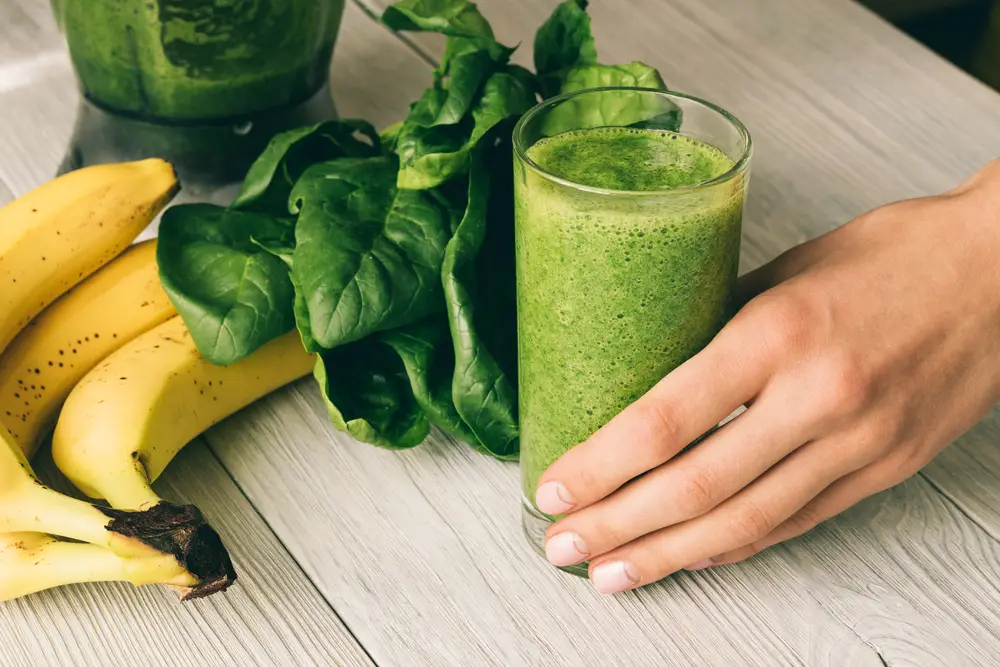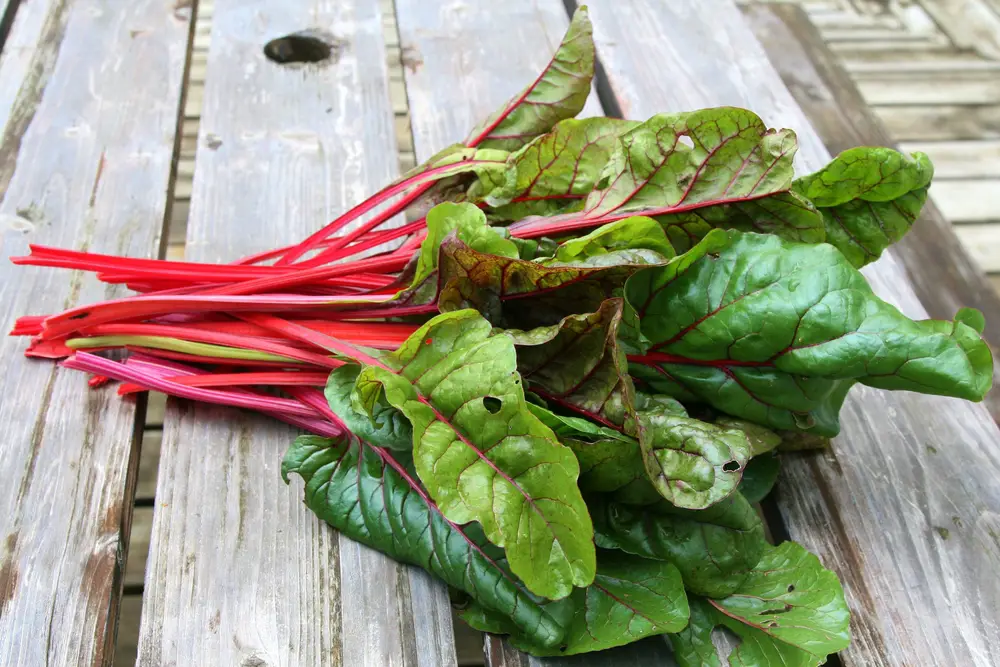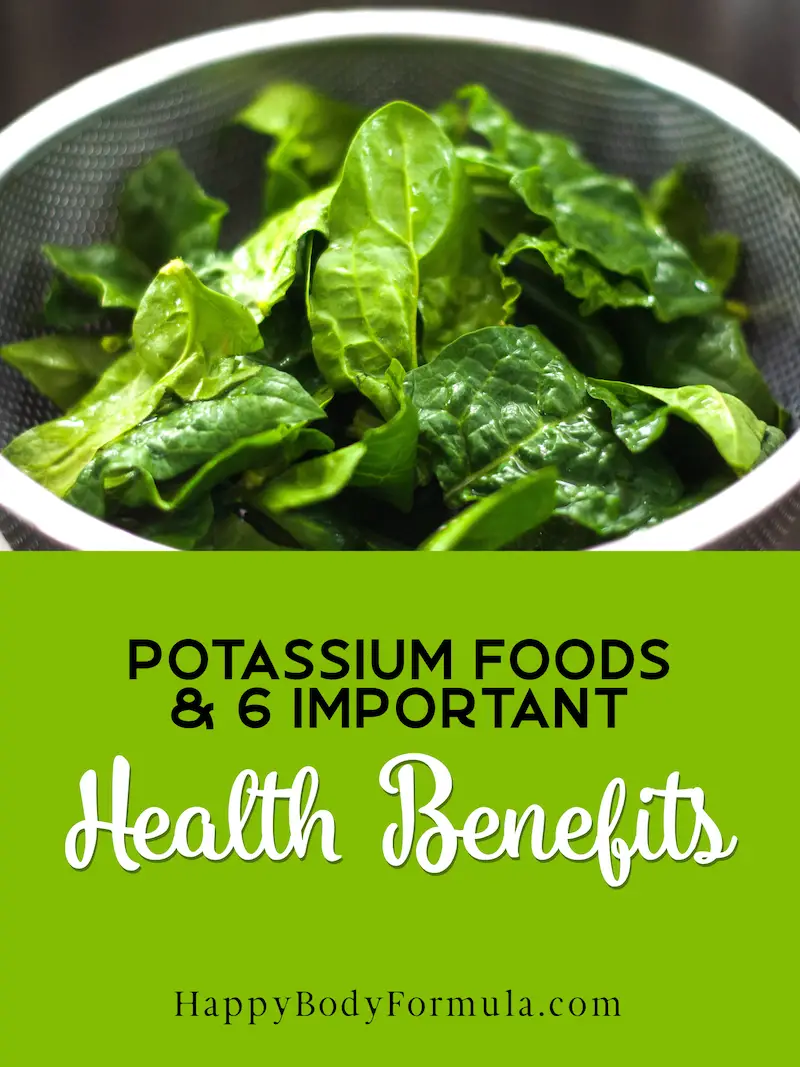
People think of potassium as coming from bananas and the thing you take if you have a muscle cramp. But it’s a mineral that does a lot more than that.
While it functions as an electrolyte in the body, it does so much more and is highly underrated.
[toc]
What is Potassium?
Potassium is found at high levels in the body and is the third most abundant. It controls how the body uses fluids and how cells take in and let out water.
It’s also important for nerve signaling, muscle contractions (which is why you get cramps when levels are too low!), and is needed for healthy bones, liver, and red blood cells. (source)
The body relies on electrolytes for maintaining homeostasis, or balance, throughout the tissues and cells. When there aren’t enough, complications can follow.
Potassium is needed in balance with other electrolytes, like magnesium and sodium, but is important in its own right.
6 Proven Health Benefits of Potassium
Potassium has many essential functions in the body. These are the top ways that it influences health.
1. Maintains Fluid Balance
Adult human bodies are about 60 to 70 percent water, so it is important that the water found within cells and tissues in the body goes (or stays) where it needs to be.
Forty percent of body fluids are inside of the cells and help them do their work. Without enough fluid, cellular energy and function can slow—which means the entire body’s energy production can be dramatically influenced by low or inadequate levels of fluid balance.
When the body gets dehydrated, it doesn’t just impact cells. It can also have a strong influence on entire organs, particularly the kidneys (which filter waste) and the heart. (source)
2. Promotes Heart Health & Normal Blood Pressure
While potassium supports the function of healthy nerve signaling, it’s also required for steady, regular heartbeats.
Potassium levels that are too high can result in an irregular heartbeat and low levels also alter the normal rhythm of this critical organ. (source)
The entire reason that the heart beats is to supply the body’s organs, tissues, and cells with a healthy blood supply. When the heart cannot beat rhythmically and effectively to do this, the entire body can suffer.
High blood pressure is another complication that interferes with heart health, and more than 30 percent of Americans deal with it one way or another. (source)
When blood pressure is consistently elevated, it can increase the risk for heart disease, heart attack, congestive heart failure, and death.
Potassium helps to reduce blood pressure by counterbalancing the effects of excessive sodium intake.
Research shows that when potassium intake increases, systolic and diastolic blood pressure both go down and that a potassium-rich diet is protective against heart disease. (source, source)
3. Protects Against Strokes
Strokes are the fifth-highest cause of death in the U.S. They are also a major cause of disability. Strokes happen when the brain has an interruption in blood flow to the brain.
Research shows that a diet high in potassium decreases the risk of experiencing a stroke by as much as 40 percent. (source)
When adults eat more than five servings daily of fruits and vegetables, they can lower their odds of having a stroke by more than 25 percent, compared to those who eat only three or fewer servings daily. (source)
4. Supports Nervous System Function
The entire job of the nervous system is communication. Between sending and receiving signals, and interpreting them via the brain, without a healthy communication network the entire body is compromised.
Nerve impulses happen when sodium ions move into cells and when potassium ions move out of cells. When the body’s potassium levels are too low or unstable, nerve impulse signaling can be strongly affected. (source)
Optimizing potassium levels helps the body to function as it should, which explains why dehydration—and low potassium levels—can result in symptoms of confusion, fatigue, and even poor coordination.
5. Supports Bone Health & Decreases Osteoporosis Risk
Osteoporosis occurs when bones become too brittle and lack the proper mineral balance to be dense enough. They can fracture easily and lead to numerous health complications.
While calcium and vitamin D are often cited as the main nutrients needed for bone health, and to prevent osteoporosis, potassium is also a critical element. This is because potassium plays a role in how the body maintains calcium levels.
When potassium levels are too low, more calcium is lost through urine and increases the chance of having too little in the body. (source)
Research shows that people who eat a diet high in potassium have greater levels of bone mass and a reduced risk of developing osteoporosis at any point. (source)
6. Supports Kidney Health & Decreases Risk of Kidney Stones
Potassium supports kidney health in a few key ways.
A diet that is higher in potassium, especially from fruits and vegetables, is associated with a decreased risk of chronic kidney disease because potassium directly decreases inflammation in this critical detox organ. (source)
Potassium can also help to reduce the risk of developing kidney stones, which are clumps of crystals that form when urine becomes excessively concentrated from dehydration. (source)
People who eat higher amounts of dietary potassium have a more than 50 percent reduced chance of developing kidney stones. (source)
For those who are prone to kidney stones for other reasons, increasing the amount of potassium in the diet can lead to a dramatic reduction in the size of kidney stones that form.
What Happens When Your Potassium Levels Are Too Low?
With potassium being such a crucial nutrient for many aspects of health like the heart, nervous system, muscles, and kidneys, it’s shocking that less than two percent of people in the U.S. get their daily potassium needs met. (source)
While the average healthy person in the population won’t have severe consequences from not getting enough, people in risk factor groups for heart disease, stroke, and kidney disease are especially at risk if their potassium intake is consistently inadequate.
The recommended daily intake for various age groups is as follows:
- 400 milligrams for infants ages 0 to 6 months
- 860 milligrams for babies ages 7 to 12 months
- 2,000 milligrams for children ages 1 to 3
- 2,300 milligrams for children ages 4 to 8, and females ages 9 to 18
- 2,500 milligrams for males ages 9 to 13
- 2,600 milligrams for females ages 19 and older
- 2,800 milligrams for adult breastfeeding women
- 2,900 milligrams for adult pregnant women
- 3,000 milligrams for males ages 14 to 18
- 3,400 milligrams for males ages 19 and older
8 Potassium Rich Foods You Can Enjoy

Many foods provide all of the potassium needed to meet daily requirements. These are the top ways to boost your dietary intake of this important mineral.
1. Dried Fruits
While dried fruits aren’t the best way to get your daily produce intake in, when eaten occasionally they do provide a nice amount of dietary potassium.
Dried apricots contain 31 percent of the daily potassium requirements in just a half-cup, while a half-cup of dried prunes provide 20 percent daily value.
One half-cup of raisins contains 18 percent daily value. When choosing dried fruits, avoid types that have added sugars or other artificial ingredients, and stick to something that is organic.
2. Lentils and Beans
Lentils and beans are both rich sources of potassium and they’re easy to add to a diet in a variety of ways. They also contain fiber and a little protein, which can contribute to other aspects of a balanced macronutrient intake.
One cup of cooked lentils contains 21 percent daily value and one cup of cooked kidney beans contains 17 percent of the body’s daily potassium needs. Soybeans and soybean products contain about 13 percent daily value per half-cup serving.
3. Squash
Acorn squash in particular is a great source of potassium. It’s also rich in fiber, vitamins, and minerals. Squash is versatile and can be cooked in many ways: baking, roasting, boiling, mashing, and even steaming.
It can be prepared sweet (with coconut sugar) or savory (with salt and pepper) and is delicious both ways. Adding some oil while cooking or roasting can also elevate the flavors. One cup of acorn squash contains 18 percent of the body’s daily potassium needs.
4. White Potatoes
While white potatoes get a bad reputation as being an unhealthy starchy food, they actually contain a surprising amount of nutrients. Comparing them to eating white rice or white bread is unfair and they certainly have a place at the table for many people.
Avoiding large amounts of white potatoes for those who are diabetic or have blood sugar issues might be a good idea, but for the general population, they can be quite healthy.
White potatoes contain 17 percent of the body’s daily potassium needs in just one medium russet potato, along with other important nutrients like vitamin C, vitamin B6, iron, and fiber.
5. Orange Juice
Most orange juice is fortified with extra nutrients, like calcium and potassium. Opting for an organic version that is free from added sugars, and is not made from concentrate, can be a great way to boost vitamin C intake as well as potassium.
A one-cup serving of orange juice contains 14 percent of the body’s daily potassium needs.
6. Bananas
Most fresh fruits contain some level of potassium, but bananas have long had a reputation for being the ultimate source of potassium. While sixth on this list, they do still contain a respectable amount.
One medium banana contains 12 percent of the body’s daily potassium needs. They’re also rich in fiber, prebiotics that nourish the healthy bacteria in the microbiome, and vitamins B6 and C.
7. Dairy Products
Most people think that dairy products only contain calcium and protein, and not much else, but a one-cup serving of milk contains 10 percent of the body’s daily potassium needs and most one-half cup servings of yogurt do the same.
You can’t drink or eat enough dairy products to replace the need for several daily servings of fruits and vegetables, but for those who can tolerate it, dairy definitely adds to the body’s potassium requirements.
When choosing dairy products, it’s important to pick organic and hormone-free options, and make sure that yogurt is not loaded with sugar and other additives.
8. Leafy Greens
Eating leafy greens every day is important for many reasons, and adding to the body’s potassium needs is a big one. Two cups of raw spinach contains 10 percent of potassium daily needs, but when cooked, a single cup contains close to 25 percent.
One cup of cooked bok choy contains 20 percent, and one cup of cooked Swiss chard contains 40 percent of the body’s daily potassium needs. All the more reason to eat these vital nutrients every single day!
How to Supplement with Potassium
It’s best for health to get your potassium needs met through diet. However, in some circumstances, a healthcare provider may recommend potassium supplements regularly or occasionally.
This must be done carefully, however, because research shows that taking too much potassium in supplement form can actually cause heart or kidney problems. (source)
Small amounts of potassium may be found in multivitamin or electrolyte supplements, and these are generally at safe amounts when paired with other nutrients.
Taking a stand alone potassium supplement is almost never recommended unless explicitly prescribed by a doctor.
Share on Pinterest

Aimee McNew, MNT, CNTP, is a certified nutritionist who specializes in women’s health, thyroid problems, infertility, and digestive wellness. She ate her way back to health using a Paleo diet, lost 80 pounds, and had a healthy baby after numerous miscarriages. She focuses on simple nutrition practices that promote long-lasting results.

